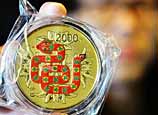
Swap line
A swap line between Britain and China would allow the Bank of England to supply yuan in exchange for other currencies if there were a sudden shortage in the London market, enabling a British company, for example, to pay for Chinese imports. But if markets function well, there would be no need to use it. Many of the PBOC's swap lines have not been used.
"I see it as a big signal to all market participants that the City of London and UK are taking this very seriously," said John McCormick, chairman of RBS Asia Pacific. "It's as important as the development of the eurodollar market 40 years ago."
London positioned itself as a natural hub for global foreign exchange and money market trading in the 1960s and 1970s, before the offshore dollar, or eurodollar, took off as free-floating currencies replaced the gold standard in 1973.
Boosted further by a combination of market deregulation and transformation of trading technology in the mid-1980s, known locally as "Big Bang," London boomed as a home for world finance, with the number of foreign banks with branches or offices in the city almost tripling in the 30 years to 1999.
While many fretted a year ago about how far the credit crisis might undermine London's role, British finance minister George Osborne launched a campaign to capture yuan business.
But convincing British or other European companies to invoice in yuan for the goods they sell to China, or to issue yuan bonds, has not always been easy, market participants say.
The yuan is only the world's 16th currency for payments, according to global transaction services organization SWIFT, and the yuan's position in global reserves is still tiny.


















 A 9-year-old son takes good care of his amputee mother:"adults have a priority over delicious meals"
A 9-year-old son takes good care of his amputee mother:"adults have a priority over delicious meals"


![]()
